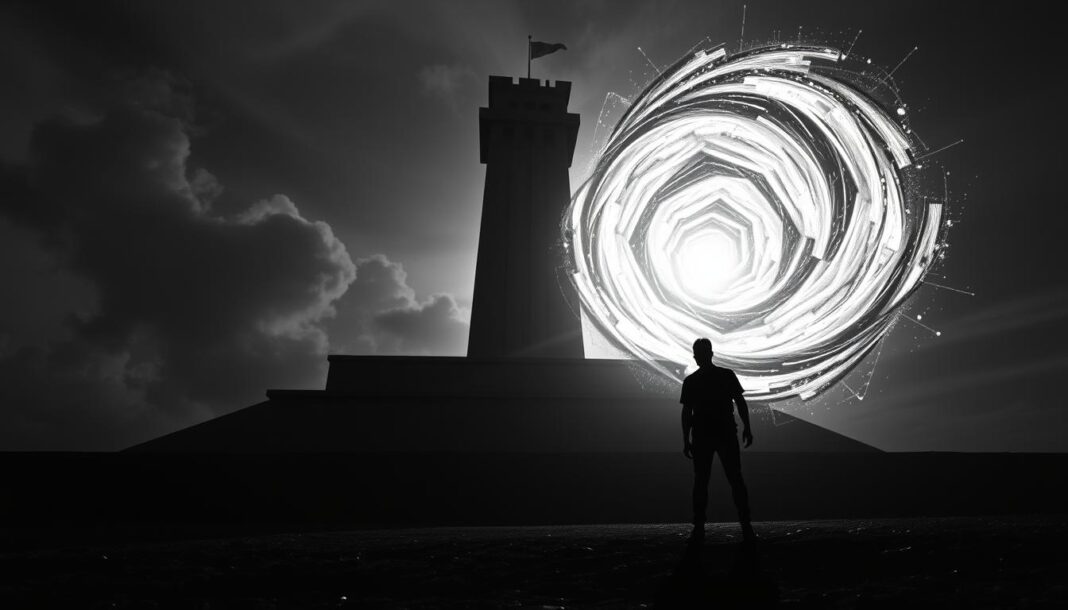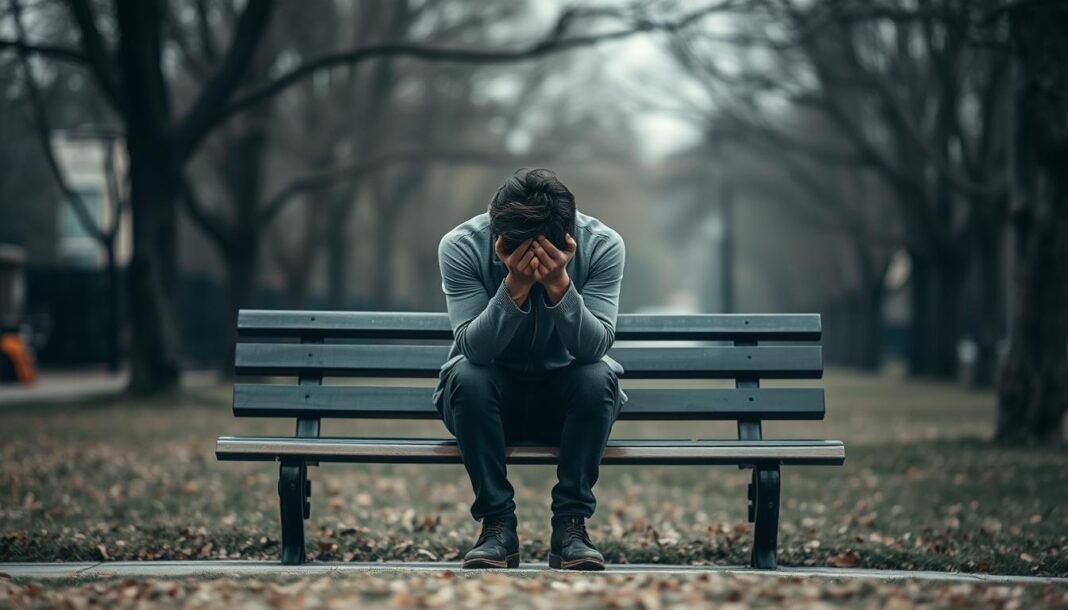In your daily life, you balance two key desires: feeling secure and enjoying freedom. These goals often clash, creating a conflict felt by people everywhere.
This tension is real, seen in talks about government watching, protecting your data, or the police’s role. The debate on security and freedom touches your life, shaping how you interact and make choices.
It’s crucial to grasp the conflict between security and freedom. This understanding helps you find a balance that suits you.
Understanding the Fundamental Concepts
Freedom is key in today’s world. It covers many parts of our lives, like personal rights and joining in democracy.
Defining Freedom in Modern Society
In today’s world, freedom means making choices freely. It’s about personal liberties like gathering, speaking out, and voting. These rights are vital for a strong democracy.
Studies show we all cherish our freedoms a lot. For example, the right to gather peacefully is crucial. It lets us share our thoughts and shape policies.
Personal Liberties You Value Most
Some freedoms we hold dear include:
- Freedom of speech
- Freedom of assembly
- Freedom to participate in the democratic process
These freedoms are key to a democratic society. They let us share our opinions and help govern.
| Personal Liberty | Description | Importance |
|---|---|---|
| Freedom of Speech | The right to express one’s opinions without censorship | High |
| Freedom of Assembly | The right to gather peacefully | High |
| Democratic Participation | The right to vote and participate in governance | High |
The table shows these freedoms are highly valued. They are essential for a democratic society.
In conclusion, knowing about freedom and its personal liberties is crucial. By understanding these, we can better live in today’s world. We can also help keep democracy alive.
Historical Context of The Conflict Between Security and Freedom
The battle between security and freedom has deep roots in history. It has changed a lot over time, shaped by key events and ideas.
Ancient and Classical Perspectives
In ancient Greece and Rome, freedom meant being part of the government. Security was about keeping the state and people safe from danger. Philosophers like Plato and Aristotle argued about finding a balance between these two.
In ancient Athens, democracy gave citizens a lot of freedom. But, the state could limit this freedom to keep things orderly and safe.
The Founding Fathers of the United States were key in balancing security and freedom. They used history and philosophy to create the Constitution and Bill of Rights. These documents protected basic freedoms.
- The Fourth Amendment guards against unfair searches and seizures, showing a value for privacy and freedom.
- Over time, the need for security has led to new laws and agencies, like the Patriot Act.
The struggle between security and freedom has always been a big issue in America. Knowing its history helps us understand today’s challenges.
Security Measures in the Digital Age
Technology keeps getting better, and we need to find a balance between security and freedom. The rise of surveillance technologies has made us think more about our privacy and security. The digital world brings new challenges that need careful handling.
Surveillance Technologies and Your Privacy
Surveillance technologies are changing how we see privacy. They can watch and track people without them knowing. This makes us wonder if we’re losing our freedom for safety.
These technologies are getting smarter, letting groups and governments gather more personal info. This worries us about how this info might be used and how it affects our privacy.
We need strong security steps to keep our data safe. This includes using tech like encryption and making rules for surveillance use. This way, we can protect our personal info and keep everyone safe.
National Security Considerations
Understanding the impact of terrorism and counterterrorism on freedom is key. This is crucial in the complex world of national security.
National security involves many strategies to protect a nation from threats. One big challenge is fighting terrorism, a global issue.
Terrorism and Counterterrorism Measures
The fight against terrorism has led to many counterterrorism steps. These steps aim to stop terrorist acts and protect targets.
Some main counterterrorism strategies include:
- Intelligence gathering and surveillance
- Law enforcement and military operations
- Legislative and policy measures to prevent terrorist financing and recruitment
But, these steps have raised concerns about individual rights. For example, more surveillance can hurt privacy. Detention policies can also raise due process issues.
The decline of human rights, like the ban on torture, is a big worry. This is because of counterterrorism efforts. “The struggle against terrorism has led to the erosion of human rights achievements, including the absolute prohibition on torture” (Source: Second web source).
To balance national security and freedom, we need counterterrorism measures that respect human rights. They should also follow the rule of law.
Public Safety vs. Individual Rights
Understanding your rights is key when dealing with law enforcement. The balance between public safety and individual rights is complex. Law enforcement agencies play a crucial role in keeping this balance.
Law Enforcement Powers and Limitations
Law enforcement has big powers to keep us safe, but they’re not unlimited. Knowing the limits of law enforcement helps us see the balance between safety and freedom.
Officers can arrest, search, and use force when needed. But, these actions must follow the law and be fair to the situation.
Your Rights During Police Encounters
You have certain rights when dealing with police, thanks to the law. For example, you have the right to remain silent, as the ACLU points out. This right protects you from saying something that could hurt you.
- You have the right to ask if you are free to leave.
- You have the right to refuse a search if the officer does not have a warrant.
- You have the right to request an attorney.
Understanding and using these rights can protect you when dealing with police.
The balance between public safety and individual rights is always changing. By knowing law enforcement’s powers and your rights, you can handle situations better where these interests meet.
The Conflict Between Security and Freedom in American Society
Modern American life shows us the trade-offs between security and freedom. Our society values both, but they often clash. This is because of the unique mix of values we hold dear.
Unique American Values and Tensions
American values like individualism, liberty, and the pursuit of happiness shape our culture. Yet, these values face challenges when we need security. This need can be for national safety, public protection, or online security.
Some key tensions include:
- The balance between surveillance for security and the right to privacy.
- Law enforcement powers versus individual rights.
- The effect of security on minority groups.
These issues have grown over time. They’ve been shaped by history, new tech, and changing values. For example, the Patriot Act and other counterterrorism laws have sparked debates about civil liberties.
Technology adds to the complexity of security and freedom. Tools like AI and surveillance systems boost security. But they also threaten our personal freedoms.
In summary, the struggle between security and freedom in America is complex. It reflects our core values and tensions. Grasping these complexities is key to creating policies that protect both security and individual rights.
Case Studies of Security-Freedom Tensions
Laws like the Patriot Act make us question our balance between security and freedom. The Patriot Act was passed after the September 11 attacks. It’s a key example in the debate over security and personal rights.
The Patriot Act and Its Implications
The Patriot Act gave law enforcement more power to gather intelligence in the U.S. It boosted security but also raised privacy and civil liberties concerns. The ability to do roving wiretaps and access business records has been a big issue.
Many worry that these actions could limit freedom by allowing too much surveillance and data collection. Critics say these powers could be misused, harming free speech and dissent. Supporters believe these steps are crucial to protect national security and stop terrorism.
The effects of the Patriot Act are wide-ranging. For example, it has been used to watch people and groups not linked to terrorism. This has led to discussions about security versus liberty. You might think about how these laws impact your daily activities, like what you share online and how you talk to others.
- The act has been renewed several times, with some changes to address privacy worries.
- Many still believe it doesn’t balance security and freedom well.
- Supporters say it’s vital in the fight against terrorism.
Looking at the Patriot Act shows how hard it is to find a balance between security and freedom. It needs ongoing talks and careful thought about how security actions affect our rights.
Different Philosophical Perspectives
The debate on security versus freedom is influenced by many philosophical views. Thinkers have always tried to find a balance between keeping everyone safe and protecting personal rights.
Libertarian Viewpoint on Minimal Security Measures
Libertarians believe in keeping security measures to a minimum. They think that individual liberty is the most important thing. They say security should be achieved with as little interference as possible.
On Libertarian.org, it’s mentioned that the goal is to keep personal freedoms safe. They believe security should be as non-intrusive as it can be.
Libertarians want the government to stay out of people’s lives as much as possible. They believe in using the free market to solve security problems and protect individual rights.
- Minimal government surveillance
- Protection of individual rights
- Free market solutions for security needs
By finding a balance, we can make sure security doesn’t take away too much of our freedom. This way, we can keep the spirit of freedom alive.
Legal Frameworks and Constitutional Considerations
When we talk about national security and personal freedom, it’s key to look at the laws. The U.S. has strong laws and parts of the Constitution that help keep everyone safe while also protecting our rights.
The U.S. Constitution, and the Bill of Rights in it, is the heart of this balance. Knowing how these laws are used helps us understand the security-freedom debate better.
First and Fourth Amendment Protections
The First Amendment guards your freedom to speak, gather, and publish. These rights are vital for a healthy democracy. They let you express your opinions and protest, keeping society open and honest.
The Fourth Amendment stops the government from searching you without good reason. It keeps you safe from unwanted searches and seizures. This is very important today, with all the new ways to watch and collect data.
At Cornell Law School, they say the Fourth Amendment is key to keeping your freedom. It protects your privacy. As technology gets better, this protection is more important than ever.
There are also laws and court decisions that help balance security and freedom. For example, laws about watching people, protecting data, and what police can do are always changing. Knowing these laws helps us see how security actions affect our rights.
In short, the laws and Constitution that balance security and freedom are complex. By looking at the First and Fourth Amendments, we can better understand the legal side of this debate.
The Economic Dimension
The economic dimension of security affects your life in big ways. Governments and groups spend a lot on security. This spending has big financial effects.
Security Costs and Economic Impact
Security costs a lot to set up and keep running. These costs include the price of tech and people. They also include the loss of privacy and freedom.
Surveillance technologies cost a lot to buy and use. They also change how we live together.
The money spent on security affects more than just government budgets. Businesses and people pay too. They pay through taxes, following rules, or fixing security problems.
Knowing these costs helps us make smart choices about spending on security.
The security costs also affect the whole economy. For example, more security at airports means higher travel costs and delays. This hurts not just travelers but also the tourism and travel industries.
Also, online security measures change how businesses compete online. They can make it harder for companies to succeed online.
When we think about security and freedom, we must consider the money side. Knowing how security spending affects us helps us see the big picture. It shows us the impact of decisions on our daily lives.
Finding Balance: Practical Approaches
When dealing with security and freedom, finding practical solutions is key. The goal is to boost security without losing personal freedom.
Transparency plays a big role here. It means being open about security steps and their effects. This builds trust and helps everyone work together.
Transparency and Accountability Mechanisms
Setting up independent groups to watch over security agencies is important. These groups make sure these agencies act right and follow the law.
The table below shows some ways to increase transparency and accountability:
| Mechanism | Description | Benefits |
|---|---|---|
| Independent Oversight Bodies | Monitor security agencies | Ensures accountability and legality |
| Public Reporting | Regular disclosure of security measures | Enhances transparency and trust |
| Judicial Review | Legal scrutiny of security actions | Protects individual rights |
To make these mechanisms work, we need a team effort. Governments, civil groups, and businesses must all play a part. Together, we can find a balance that keeps everyone safe and free.
Studies show that transparency and accountability are vital. By being open and having checks, we can safeguard freedom while keeping the country safe.
Future Challenges and Emerging Technologies
New technologies like artificial intelligence, predictive policing, and facial recognition are changing how we think about security and freedom. These advancements offer better security but also raise questions about our personal rights.
Artificial Intelligence and Predictive Policing
Artificial intelligence (AI) is now used in law enforcement for predictive policing. AI looks at lots of data to guess where crimes might happen. This helps police act before crimes occur. But, there are worries about AI bias and pre-emptive policing that might hurt our rights.
Predictive policing with AI can make police work better. But, we need to make sure these tools are fair and unbiased. This means we need transparency and accountability in how they’re used.
Facial Recognition in Public Spaces
Facial recognition technology is being used in public areas for safety. It can spot people in real-time, making places safer. But, it also makes us think about privacy, as it can track us without asking.
Using facial recognition in public places is a tricky issue. We need to find a way to balance safety with privacy. It’s important to have legal rules and public checks on these technologies.
As we explore these new technologies, we must keep talking about the balance between safety and freedom. By understanding these technologies, we can aim for a future where everyone is safe and their rights are respected.
Conclusion
The fight between security and freedom is complex. It involves history, security steps, national safety, and different views. Each part is key to understanding this issue.
To find a middle ground, we must focus on being open and responsible. We should use security steps that match the threats. At the same time, we must keep people’s rights safe.
The debate on security versus freedom needs careful thought. Knowing the risks and benefits helps us make smart choices. This way, we can support both security and freedom.
Keeping a balance between security and freedom is a constant task. New tech and threats come up, so we must stay alert. We must protect our rights while keeping our country safe.



